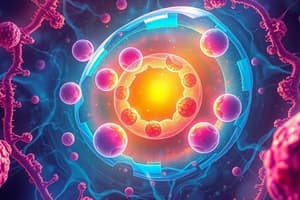Podcast
Questions and Answers
What is the function of mitochondria in a cell?
What is the function of mitochondria in a cell?
- DNA storage
- Protein folding
- Protein synthesis
- Energy production (correct)
Which structure is responsible for protein synthesis in a cell?
Which structure is responsible for protein synthesis in a cell?
- Nucleus
- Endoplasmic reticulum
- Mitochondria
- Ribosomes (correct)
What is the main function of enzymes in a cell?
What is the main function of enzymes in a cell?
- Protein synthesis
- Catalyze biochemical reactions (correct)
- DNA storage
- Energy production
Which cellular component serves as selective passageways controlling transport across the membrane?
Which cellular component serves as selective passageways controlling transport across the membrane?
What is the role of genetic information in a cell?
What is the role of genetic information in a cell?
Which cellular components are involved in tightly regulated cascades conveying biological signals?
Which cellular components are involved in tightly regulated cascades conveying biological signals?
What is the main role of signaling networks in cell biology?
What is the main role of signaling networks in cell biology?
Which stage ensures continuity of cell populations through cycles?
Which stage ensures continuity of cell populations through cycles?
What can result from mutations or errors during replication and division?
What can result from mutations or errors during replication and division?
Which field of applied cell biology focuses on bioenergetics and membrane physiology?
Which field of applied cell biology focuses on bioenergetics and membrane physiology?
Why is understanding the inner workings of the cell important?
Why is understanding the inner workings of the cell important?
What do signaling networks do in response to stimuli?
What do signaling networks do in response to stimuli?
Flashcards are hidden until you start studying
Study Notes
Exploring Cell Biology: An Overview
Cell biology forms the cornerstone of modern life sciences, delving deep into the microscopic realm where living entities thrive—the cell. From understanding the structures that make cells functional to clarifying intricate molecular interactions, cellular biology enriches our grasp of fundamental biological processes.
Core Concepts and Key Players
At the heart of cell biology lies a cast of characters whose actions drive cellular function:
- Organelles: Membrane-bound compartments with specialized functions, such as mitochondria (energy production), ribosomes (protein synthesis), endoplasmic reticulum (protein folding), and nucleus (DNA storage).
- Membranes: Lipid bilayers that define cell boundaries while controlling transport across the membrane. Selective passageways called channels, pores, and transporters maintain balance within and among cells.
- Proteins: Complex molecules composed of amino acids, serving catalytic roles, structural functions, signaling duties, or acting as building blocks for larger macromolecules.
- Enzymes: Catalysts that speed up biochemical reactions, playing pivotal roles in metabolism and gene regulation.
- Genetic information: DNA sequences encoding genetic blueprints. Genes instruct the cell's protein machinery, dictating functionality and adaptation.
- Signaling networks: Tightly regulated cascades conveying biological signals, thereby modulating cell behavior. Signaling networks involve proteins activated in response to stimuli, altering cell fate decisions and responses to environmental conditions.
Cell Division Processes
Cell division ensures continuity of cell populations through cycles consisting of stages such as nuclear division (mitosis) and cytoplasmic separation (cytokinesis) in animals and plants. Mutations or errors during replication and division can result in diseases such as cancer and human disorders, emphasizing the importance of accurate copying and segregation of chromosomal information.
Field Applications
Applied cell biology spans expansive areas encompassing agriculture, medicine, and biotech industries. Research focuses on genetics, stem cell technology, bioenergetics, signal transduction, and membrane physiology. These fields aim to improve crop yields, develop treatments for illnesses, provide tissue regeneration strategies, enhance energy efficiency, and decipher previously unknown mechanisms driving cellular activity.
In summary, cell biology provides fertile grounds for exploration, offering explanations for basic phenomena as well as potential therapeutic avenues. By understanding the inner workings of the cell, we gain insights into biological processes, design new technologies, and expand our knowledge base concerning the wonders of living beings, raising opportunities for innovation, discovery, and disease prevention.
Studying That Suits You
Use AI to generate personalized quizzes and flashcards to suit your learning preferences.





